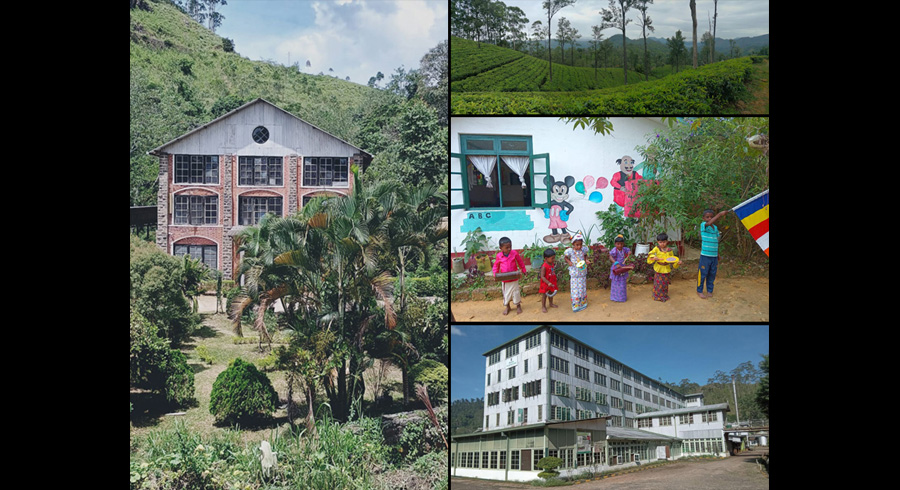With over 130 years of continuous cultivation, it serves as a living museum of Sri Lanka’s tea legacy.
Established in the late 19th century, Demodera’s reputation is rooted in its rich history, meticulous cultivation methods and commitment to innovation.
Originally comprised of five divisions, namely, Southam, Weyvelheena, Oetumbe, Neterville and Rossett, the estate underwent several transformations over the decades, including a re-amalgamation of the Rossett Division in 2010.
Today, it spans 1,109.25 hectares across four main divisions, with nearly half of this area under thriving tea cultivation.
Impressively, 45% of the planted area consists of VP (vegetatively propagated) tea, while 55% consists of heritage-rich seedling tea.
Complementing this tea-centric terrain are Eucalyptus plantations and a green manure nursery that serves both the estate and surrounding smallholder farmers.
From its first VP block planted in 1959 to its latest technological upgrades, Demodera has continuously adapted while maintaining the highest traditions.
The estate has changed hands multiple times, from agency house management by Whittall Boustead Ltd., to state management under the Janatha Estates Development Board and later to James Finlay Plantations.
Since 2021, Browns Plantations PLC has steered the estate into a new era of sustainable, community-focused tea production.
Tea, Technology and Tradition
Demodera is a landmark in Sri Lanka’s tea history.
Its contribution to the industry is most tangibly seen through its two iconic factories.
The first, built in 1893 near the Colombo–Badulla road, now serves as a reprocessing center for BMF tea.
The second, located in the Southam Division near the railway station, dates back to 1912 and processes over 1.2 million kilos of made tea annually using the Orthodox method.
It serves as a production hub for neighbouring estates as well.
A standout milestone in Demodera’s development was the establishment of its own hydro power station in 1937 which highlights its focus on sustainability and renewable energy.
Generating 750 units of electricity per day from the two rivers crisscrossing the estate, this innovation has powered operations and reduced environmental impact long before climate-consciousness became a global movement.
Modern advancements complement this legacy. Energy-efficient dryers, biomass boilers, solar panels and composting systems work in tandem with traditional tea-making techniques to produce over 20 specialty grades of tea.
From expertly hand-plucked leaves to the famous July–September Uva season that yields citrusy, aromatic brews, Demodera’s teas are sought after by the discerning connoisseurs and specialty blenders alike.
Beyond technology, Demodera is an award-winning institution.
Recognized as the Best Factory by the Ministry of Plantations and honored by the Tea Exporters’ Association in 2024, the estate continues to set benchmarks for quality, ethical practices and environmental stewardship.
A Tea Estate That Gives Back
At the heart of Demodera’s success lies its people.
The estate employs thousands, primarily from the local Tamil community, offering stable income and contributing significantly to Sri Lanka’s export revenue.
By creating indirect employment in transport, retail and small-scale trade, Demodera plays a central role in the region’s economic fabric.
Estate’s education initiatives support local schools and provide scholarships for estate children.
Medical facilities on-site and the presence of a government hospital within estate boundaries ensure access to healthcare.
Continuous improvements in housing, water and sanitation reflect a people-first philosophy, while skill development and women’s empowerment programs, especially those run in collaboration with the Plantation Human Development Trust (PHDT), promote independence among workers.
Demodera’s agricultural practices are equally community and environment-conscious.
The estate invests in soil conservation, water-efficient irrigation and eco-friendly pest management using natural solutions like Neem.
Native shade trees planted across the estate support biodiversity, creating a balance between cultivation and conservation.
Tourism is also a major part of its evolving identity.
The Demodera Guest Bungalow, a colonial-era ‘gem’ built in 1926, offers visitors a window into plantation life and the serene beauty of the salubrious Uva hills.
From the nearby Nine Arch Bridge to Rawana Falls, the region shines with cultural and natural landmarks, drawing travelers and tea lovers to its splendour.
The rare spiral loop on the railway line which runs under the station, highlights the unique engineering marvel established in the colonial era.
Through partnerships with the Tea Research Institute, Sri Lanka Tea Board and The Plantation Human Development Trust [PHDT] Demodera Estate continues to move towards a future that blends heritage with innovation, tradition and transformation.






















